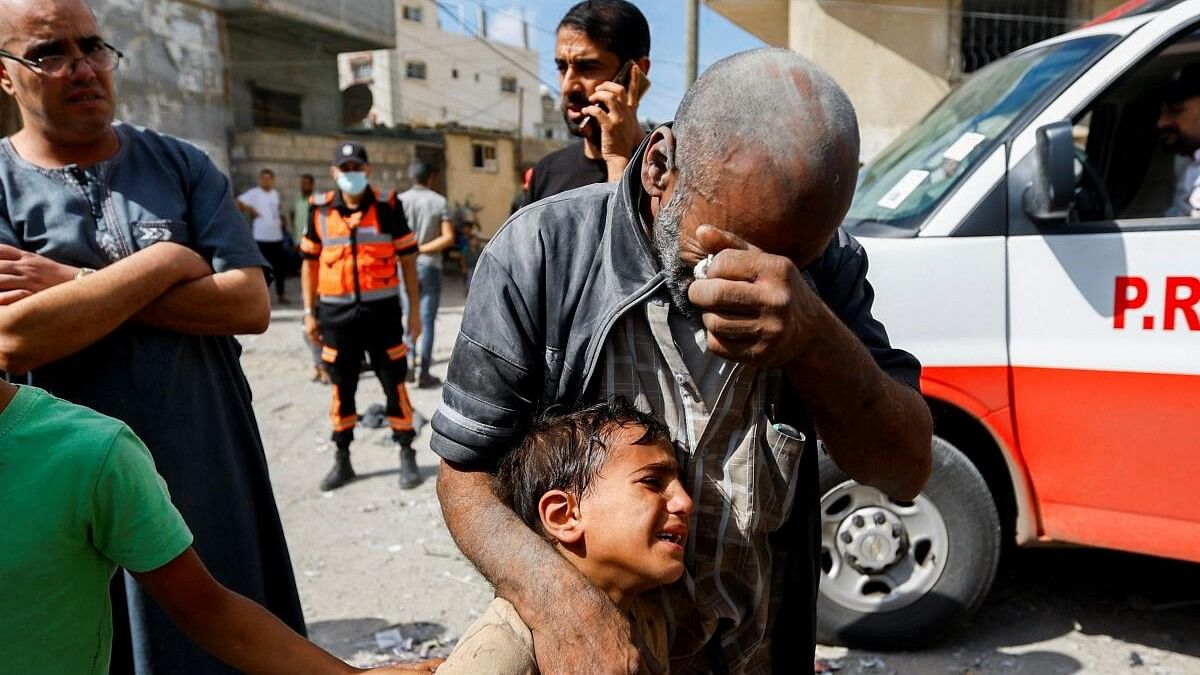
Palestinians react, at the site of Israeli strikes on houses, in Rafah in the southern Gaza Strip October 17, 2023.
Credit: Reuters Photo
The United Nations warned on Tuesday that Palestinian civilians in the Gaza Strip are being "packed into an ever-smaller area" and life-saving essentials have essentially run out, appealing for a humanitarian truce to allow aid access.
"It is now estimated that as many as 1 million people have fled their homes to other parts of Gaza," senior U.N. aid official Joyce Msuya told a meeting convened by Arab envoys on the enclave, which is controlled by Hamas militants.
Israel last week ordered some 1.1 million people in Gaza - almost half the population - to move to south as it prepares for a ground offensive in retaliation for the worst Hamas attack on civilians in Israel's 75-year-old history.
"In reality, civilians have nowhere to go — nowhere to escape the bombs and missiles, and nowhere to find water or food, or to escape the unfolding humanitarian catastrophe," Msuya said, urging a "humanitarian suspension of hostilities."
Israel has put Gaza under a total siege and subjected it the most intense bombardment ever. It has vowed to annihilate Hamas after it killed 1,300 people and seized hostages in an Oct. 7 attack on Israel. Some 3,000 Palestinians have been killed.
International diplomacy has been focused on trying to broker a humanitarian pause in the conflict near the Rafah border crossing between Egypt and Gaza to allow the delivery of aid. Egypt says Rafah has not been officially closed but has become inoperable due to the Israeli air strikes on the Gaza side.
"We can't move humanitarian trucks and convoys while active bombardment is ongoing," U.N. spokesman Stephane Dujarric said on Tuesday. "There are intense discussions going on, in which we're involved, with a number of parties in order to try to get the most basic humanitarian aid in as quickly as possible."
After nine hours of negotiations, U.S. Secretary of State Antony Blinken said early on Tuesday he had agreed with Israel "to develop a plan" to get aid into Gaza. He gave no details. U.S. President Joe Biden is due to visit Israel on Wednesday.
U.N. aid chief Martin Griffiths is traveling to Egypt on Tuesday and plans to visit Israel, while U.N. Secretary-General Antonio Guterres is due to arrive in Cairo on Thursday.
Ted Chaiban, a deputy executive director at the U.N. children's agency UNICEF, told the meeting on Tuesday that there was a risk of an infectious disease outbreak in Gaza as water supplies run out.
"We have a population of 2.3 million in Gaza, essentially without drinking water. We're down to three liters per person, when the normal average should be 15 litres," he said.